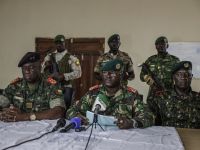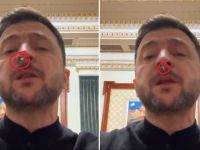Iraq agreed Monday to allow the unconditional return of U.N. weapons inspectors. The U.S. administration dismissed the offer as a tactical move.
"This is not a matter of inspections. It is about disarmament of Iraq's weapons of mass destruction and the Iraqi regime's compliance with all other Security Council resolutions," White House spokesman Scott McClellan said in a statement. The statement called it "a tactical step by Iraq," likely aimed at dividing the U.N. Security Council and eroding support there for U.S. aims on Iraq.
The United States demanded a "new, effective U.N. Security Council resolution that will actually deal with the threat Saddam Hussein poses to the Iraqi people, to the region and to the world."
Other key UN members were more cautious, with only Russia among the five permanent Security Council members immediately welcoming the Iraqi move. "Thanks to our joint efforts, we managed to avert the threat of a war scenario and go back to political means of solving the Iraqi problem," Foreign Minister Igor Ivanov said.
French Foreign Minister Dominique de Villepin said the council "must now hold Saddam Hussein to his word."
And British Prime Minister Tony Blair noted Saddam had a "long history of playing games."
Earlier, Baghdad said in a letter addressed Monday to U.N. Secretary-General Kofi Annan, that its decision to allow the inspectors' return was taken "to remove any doubts that Iraq still possesses weapons of mass destruction."
"I am pleased to inform you of the decision of the Government of the Republic of Iraq to allow the return of the United Nations weapons inspectors to Iraq without conditions," the Iraqi letter said. It was signed by Iraq Foreign Minister Naji Sabri and delivered to Annan, who made the declaration.
There was no mention of the United States in the Iraqi letter although it alluded to talk of a possible attack by calling on the members of the Security Council, which includes the United States, to "respect the sovereignty, territorial integrity and political independence of Iraq."
Iraq said it was responding to an earlier appeal by Annan for Baghdad's compliance with Security Council resolutions calling for unfettered access to inspectors, and to an appeal by the Arab League and other Islamic countries.
Annan forwarded the letter to all 15 members of the council and to the chief weapons inspector, Hans Blix.
It was not clear when the council would meet to consider the letter, a first step before sending inspectors back. Blix has said he could have inspectors on the ground within days but it would take his teams several months to set-up on the ground before they could start monitoring Iraqi facilities.
In a statement, Blix welcomed the Iraqi letter and said he was prepared for immediate contacts with the Iraqis "on the practical arrangements for the resumption of inspections."
The Iraqi letter was released following high-level meetings Saddam held earlier Monday with senior officials in his Baath party and his Cabinet, including his deputy prime minister and vice president.
"I can confirm to you that I have received a letter from the Iraqi authorities conveying its decision to allow the return of inspectors without conditions to continue their work," Annan told reporters.
"There is good news," Sabri said moments earlier. The Iraqi foreign minister refused to comment further and left U.N. headquarters after a day of negotiations on the text of the letter.
The secretary-general also said the Arab League had played a key role in bringing about the Iraqi response and he thanked the league's chief, Amr Moussa, "for his strenuous efforts in helping to convince Iraq to allow the return of the inspectors." (Albawaba.com)
© 2002 Al Bawaba (www.albawaba.com)







